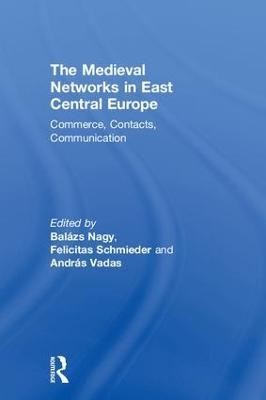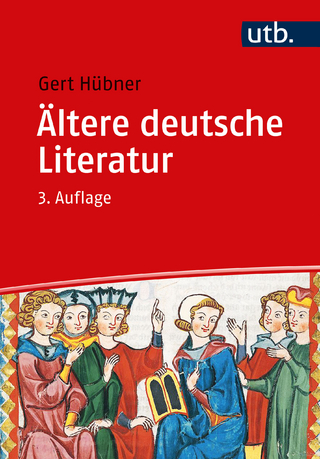
The Medieval Networks in East Central Europe
Routledge (Verlag)
978-1-138-55484-9 (ISBN)
Medieval Networks in East Central Europe explores the economic, cultural, and religious forms of contact between East Central Europe and the surrounding world in the eight to the fifteenth century. The sixteen chapters are grouped into four thematic parts: the first deals with the problem of the region as a zone between major power centers; the second provides case studies on the economic and cultural implications of religious ties; the third addresses the problem of trade during the state formation process in the region, and the final part looks at the inter- and intraregional trade in the Late Middle Ages.
Supported by an extensive range of images, tables, and maps, Medieval Networks in East Central Europe demonstrates and explores the huge significance and international influence that East Central Europe held during the medieval period and is essential reading for scholars and students wishing to understand the integral role that this region played within the processes of the Global Middle Ages.
Balázs Nagy is Associate Professor of Medieval History at Eötvös Loránd University, Budapest and visiting faculty at the Department of Medieval Studies at the Central European University, Budapest. His main research interests are medieval economic and urban history. Felicitas Schmieder is Professor of Pre-Modern History at Fernuniversität Hagen. Her main research interests are the history of cross-cultural contacts, urban history, cultural memory, and pre-modern cartography. András Vadas is Assistant Professor of Medieval History at Eötvös Loránd University, Budapest. His research interests are the environmental, urban, and economic history of the Middle Ages and the Early Modern period.
Introduction; Part One: East Central Europe – No Man’s Land or Historical Region?; Chapter 1: Reimagining Europe: An Outsider Looks at the Medieval East–West Divide; Chapter 2: The Carpathian-Danubian Region during the Eighth and Ninth Centuries: A General View Based on Archaeological Records; Chapter 3: The Entry of Early Medieval Slavs into World History: the Chronicle of Moissac; Chapter 4: Medieval Latin Europe Connecting with the Rest of the World: The East Central European Link; Part Two: Christianization and the East-West link; Chapter 5: Gregory the Great and the Bishops. Papal Letters and the Ecclesiastical Integration and Disintegration of East Central Europe; Chapter 6: Children in Eleventh- and Twelfth-Century Hungary and Poland: an Archaeological Comparison; Chapter 7: Technologies on the Road between West and East. The Spread of Water Mills and the Christianization of East Central Europe; Chapter 8: The Impact of Castles on the Development of the Local Church System in Hungary in the Eleventh and Twelfth Centuries; Part Three: Trade relations of East Central Europe in the age of state formation; Chapter 9: The Logic of Tribute versus the Logic of Commerce: Why Did Dirhams Reach East Central Europe during the Tenth Century?; Chapter 10: The Importance of Long-Distance Trade for the Slavic Princes in the Early and High Middle Ages; Chapter 11: Bence Péterfi, The Heyday and Fate of an Early Trade Center: Graphite Pottery in Early Óbuda; Part Four: Trade relations of East Central Europe in the late medieval period; Chapter 12: Mining, Coinage, and Metal Export in the Thirteenth Century: the Czech Lands and Italy in Comparative Perspective; Chapter 13: Late Medieval Gdańsk as a Bridge between Regions: Western European, Hanseatic, and East Central European Contacts; Chapter 14: Grzegorz Myśliwski, A Silesian Town and the Hungarian Monarchy. Economic Contacts between Wrocław and Hungary, ca. 1250–1500; Chapter 15: Transit Trade and Intercontinental Trade during the Late Middle Ages: Textiles and Spices in the Customs Accounts of Brașov and Sibiu; Chapter 16: Reflected in a Distorted Mirror: Trade Contacts of Medieval East Central Europe in Recent Historiography
| Erscheinungsdatum | 16.10.2018 |
|---|---|
| Zusatzinfo | 16 Tables, black and white; 32 Halftones, black and white |
| Verlagsort | London |
| Sprache | englisch |
| Maße | 156 x 234 mm |
| Gewicht | 840 g |
| Themenwelt | Geschichte ► Allgemeine Geschichte ► Mittelalter |
| Geisteswissenschaften ► Geschichte ► Regional- / Ländergeschichte | |
| Geschichte ► Teilgebiete der Geschichte ► Wirtschaftsgeschichte | |
| ISBN-10 | 1-138-55484-7 / 1138554847 |
| ISBN-13 | 978-1-138-55484-9 / 9781138554849 |
| Zustand | Neuware |
| Haben Sie eine Frage zum Produkt? |
aus dem Bereich


